British Army racism apology to black ‘poster girl’ soldier
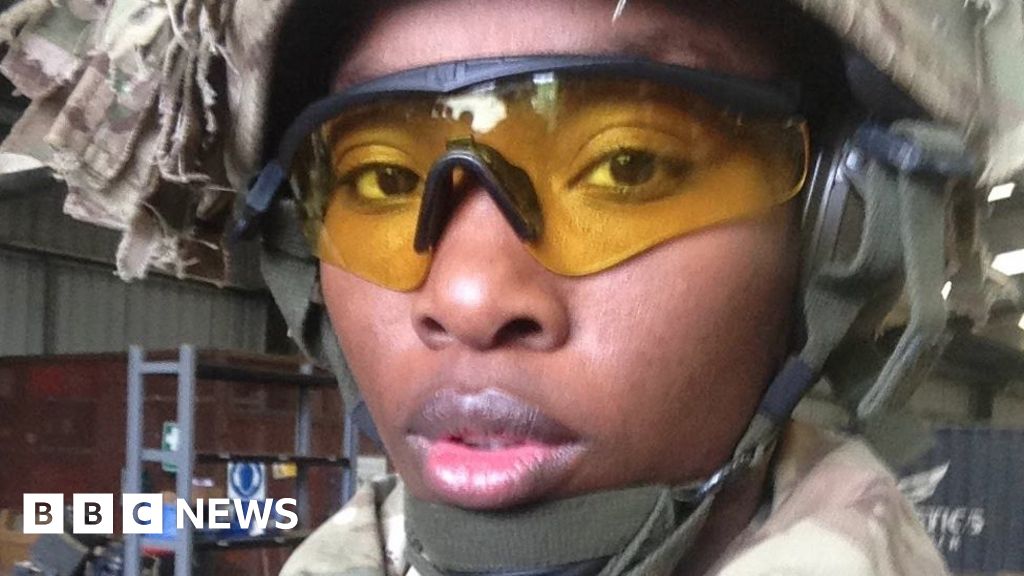
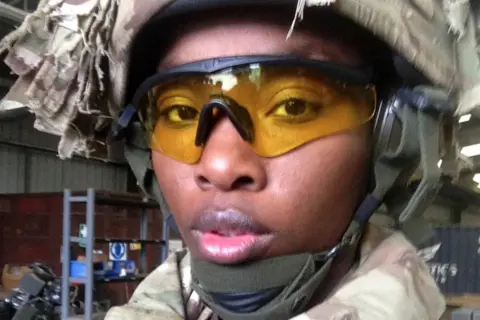 Kerry-Ann Knight
Kerry-Ann KnightA black female soldier who fronted British Army recruitment campaigns has spoken for the first time about how years of racist abuse and bullying made her life whilst serving “a living hell”.
Kerry-Ann Knight, 33, took her case to an employment tribunal and accepted a substantial settlement from the Ministry of Defence (MoD) last month.
She says when her complaints weren’t taken seriously she began secretly recording conversations – including one where laughter could be heard after a white male soldier said “just [expletive] tar and feather her, it’s what they used to do in the old days”.
Mrs Knight and the MoD settled before a final judgement was made, after the Army agreed to making a public apology.
It said it “accepts that Mrs Knight had to work in an unacceptable organisational environment where she experienced racist and sexist harassment”.
However, the MoD said this week it had settled the claim with no admission of liability.
Warning: This article contains details some readers may find upsetting
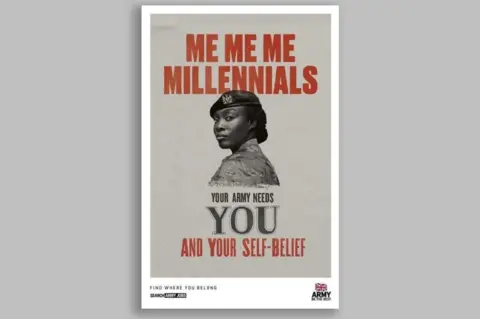 Ministry of Defence
Ministry of DefenceMrs Knight, who grew up in Nottingham, served in the Army for more than a decade and left as a corporal earlier this year – after having launched an official service complaint about the racist and sexist incidents she says she endured.
She sat down with the BBC to talk about the realities of being a black woman in the British Army and said that despite initially having been “excited” to join, she would no longer recommend it.
“I’d never encourage any woman, especially of colour, to join, because it’s not going to benefit your life in the long run.”
The racist and sexist abuse began early in her army career in 2012, says Mrs Knight.
She says she had to serve alongside soldiers who claimed to support the far-right groups – the Ku Klux Klan, Britain First and English Defence League.
Mrs Knight also told the BBC:
- During one of her first postings, to Germany, she was told to avoid a certain corridor because soldiers were openly displaying swastikas, Confederate flags and other symbols associated with the far right
- Male soldiers would shout out racially offensive insults – followed by “I’d still shag you though”
- She was reprimanded by a senior female soldier during training for the way she wore her hair in braids to go swimming. “This isn’t the ghetto,” she was told
- A senior colleague physically assaulted her in 2013 – motivated, she believes, by racism
Things would come to a head in 2021, when Mrs Knight began working as the only black female instructor at the Army Foundation College in Harrogate. The Army trains its 16- and 17-year-old junior soldiers there.
She says several of her fellow white male instructors made it apparent from the start that she wasn’t welcome. “They just thought they were superior to me, and they were going to make my life a living hell.”
The hostility began with what some in the Army might wish to dismiss as “banter”.
Boxes and dirty crockery would be piled high on her desk, she says, and people would shout out “watermelon” as “their signal that a black person was approaching the office”.

Django Unchained – a film about a slave – was played loudly in the office, she says.
“It was their way of making me feel unwelcome because they’d repeat the most racist lines, and then chuckle.”
Some soldiers at Harrogate would question her professional qualifications, says Mrs Knight.
When she offered to make a round of hot drinks she says one colleague replied saying he would like his coffee to be “black and bitter – like my women”.
Images of Hitler and a photo of a man’s genitals were openly posted on a Whatsapp group for the instructors – of which she was a member.
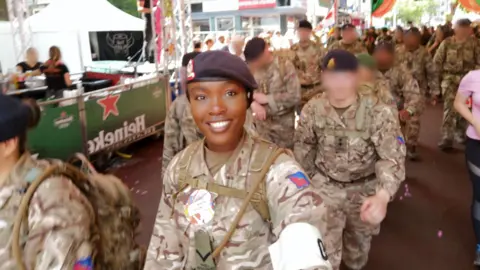 Kerry-Ann Knight
Kerry-Ann Knight Then, in November 2021 at a dinner in the officers’ mess, Mrs Knight says a fellow instructor aggressively shouted abuse in her face.
She says she had raised concerns about racist and sexist incidents earlier in her career, but this time she decided to launch an official service complaint – which can investigate issues of bullying, harassment, discrimination and biased, improper or dishonest behaviour.
It was from this moment that she also began to secretly record some of the conversations taking place behind her back.
In one of the audio files, she says the men “spoke about lynching me”.
She cried during her interview with the BBC and says she couldn’t have got through it all without the help of colleagues who had been willing to speak up in support of her.
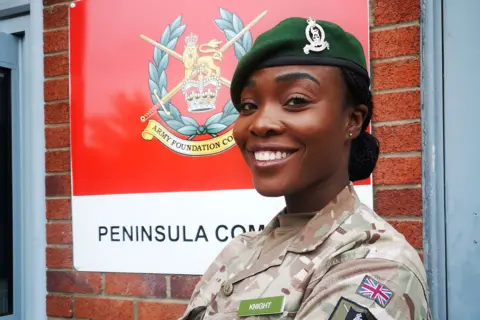
‘I wanted more individuals of colour to join’
Despite everything, Kerry-Ann Knight told us she had wanted to help the Army change – and had willingly taken part in a number of recruitment campaigns, including being the “poster girl” for one in 2019 aimed at millennials.
“I wanted more individuals of colour to join, because I just thought, the Army cannot continue like this – it really can’t”, she says.
She knew women and ethnic minorities were under-represented groups and says she was selected to front campaigns because of this. Women make up 11.7% of the UK’s armed forces and ethnic minorities 11.2%.
But, when the 2019 campaign went public, there was a backlash, which was was reported at the time.
British soldiers accused her online of “playing the race card” and of being just “a tick in the diversity box”.
- Support and information on racism and racist hate crime can be found at BBC Action Line
The Army Foundation College in Harrogate, where Knight worked until leaving her job, has been the focus of several investigations into bullying and sexual offences. North Yorkshire Police looked into 13 separate sexual offences there last year.
One of the college instructors she complained about was later discharged from the Army for having had sex with a 16-year-old female junior soldier.
Mrs Knight says she also witnessed bullying and racist insults aimed at junior soldiers at the site. She says she spoke out, which only made her life more difficult.
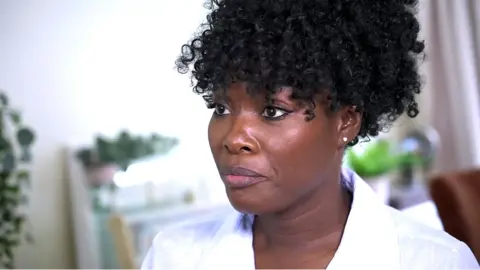
‘Army closed ranks’
The Army claims it has a zero tolerance policy of unacceptable behaviours. But Kerry-Ann Knight believes the complaint process is primarily designed to protect the organisation and “is not fit for purpose”.
The Army closed ranks, she says, and tried to “paint her out as an aggressive black woman”.
Mrs Knight took her case to an employment tribunal in June and – at first – the Army publicly contested her case. But after hearing evidence for seven days, it backed down.
During the tribunal the former soldier was “put through days of very nasty cross-examination”, according to her lawyer, Emma Norton from the Centre for Military Justice.
“It is all dreadfully familiar and shows that, in the British Army, it’s worse to accuse someone of racism than it is to be racist,” she said.
Mrs Knight’s case was also supported by the Equality and Human Rights Commission and its chairwoman, Baroness Kishwer Falkner says the former corporal is “an inspiration to young soldiers”.
“It is such a shame that the Army has lost a talent like hers.”
Related
Youth football teams hold minute’s silence for 10-year-old Poppy Atkinson
Youth football teams and grassroots clubs across the country have held a minute’s silence at the start of their games to commemorate a 10-year-old girl who di
Girl’s death sparks minute’s silence at football matches nationwide
10-year-old Poppy Atkinson was killed when she was struck by a car during a training session at Kendal Rugby Club in Cumbria. Clubs from Leeds to London
Liverpool fans’ Uefa claim can be heard in England, judge…
The high court, sitting in Liverpool, heard Uefa had relied upon the principle that English courts will not inquire into the legality of actions by foreign gove
Alan Shearer’s Premier League predictions including Manchester United vs Arsenal
Caption: Alan Shearer?s Premier League predictions credit: Getty / Metro After some impressive results for English sides in Europe the focus is













